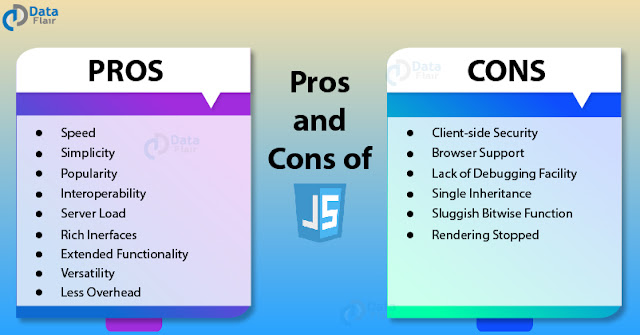Advantages of JavaScript
Firstly, we will discuss the benefits or advantages of using JavaScript –
1. Speed
Since JavaScript is an
‘interpreted’ language, it reduces the time required by other programming languages like
Java
for compilation. JavaScript is also a client-side script, speeding up
the execution of the program as it saves the time required to connect to
the server.
2. Simplicity
JavaScript
is easy to understand and learn. The structure is simple for the users
as well as the developers. It is also very feasible to implement, saving
developers a lot of money for developing dynamic content for the web.
3. Popularity
Since
all modern browsers support JavaScript, it is seen almost everywhere.
All the famous companies use JavaScript as a tool including
Google, Amazon, PayPal, etc.
4. Interoperability
JavaScript
works perfect with other programming languages and therefore numerous
developers prefer it in developing many applications. We can embed it
into any webpage or inside the script of another programming language.
5. Server Load
As
JavaScript operates on the client-side, data validation is possible on
the browser itself rather than sending it off to the server. In case of
any discrepancy, the whole website needs not to be reloaded. The browser
updates only the selected segment of the page.
6. Rich Interfaces
JavaScript
provides various interfaces to developers for creating catchy webpages.
Drag and drop components or sliders may give a rich interface to the
webpages. This leads to improved user-interactivity on the webpage.
7. Extended Functionality
Third-party add-ons like
Greasemonkey (a Mozilla Firefox extension)
allow the developers to add snippets of predefined code in their code
to save time and money. These add-ons help the developers build
JavaScript applications a lot faster and with much more ease than other programming languages.
8. Versatility
JavaScript
is now capable of front-end as well as back-end development. Back-end
development uses NodeJS while many libraries help in front-end
development like
AngularJS, ReactJS, etc.
9. Less Overhead
JavaScript
improves the performance of websites and web applications by reducing
the code length. The codes contain less overhead with the use of various
built-in functions for
loops, DOM access, etc.
Disadvantages of JavaScript
Now
after discussing the advantages of using JavaScript, its time to have a
look at some disadvantages of using JavaScript which we have briefly
discussed below –
1. Client-side Security
Since
the JavaScript code is viewable to the user, others may use it for
malicious purposes. These practices may include using the source code
without authentication. Also, it is very easy to place some code into
the site that compromises the security of data over the website.
2. Browser Support
The
browser interprets JavaScript differently in different browsers. Thus,
the code must be run on various platforms before publishing. The older
browsers don’t support some new functions and we need to check them as
well.
3. Lack of Debugging Facility
Though some HTML editors support debugging, it is not as efficient as other editors like C/
C++ editors. Also, as the browser doesn’t show any error, it is difficult for the developer to detect the problem.
4. Single Inheritance
JavaScript
only supports single inheritance and not multiple inheritance. Some
programs may require this object-oriented language characteristic.
5. Sluggish Bitwise Function
JavaScript stores a number as a
64-bit floating-point number and operators operate on
32-bit
bitwise operands. Thus, JavaScript converts the number to 32-bits
signed integers, operates on them and converts them back to 64-bits
JavaScript numbers. This continuous conversion takes more time in
conversion of number to an integer. This increases the time needed to
run the script and reduces its speed.
6. Rendering Stopped
A
single code error can stop the rendering of the entire JavaScript code
on the website. To the user, it looks as if JavaScript was not present.
However, the browsers are extremely tolerant of these errors.






0 Comments:
Post a Comment